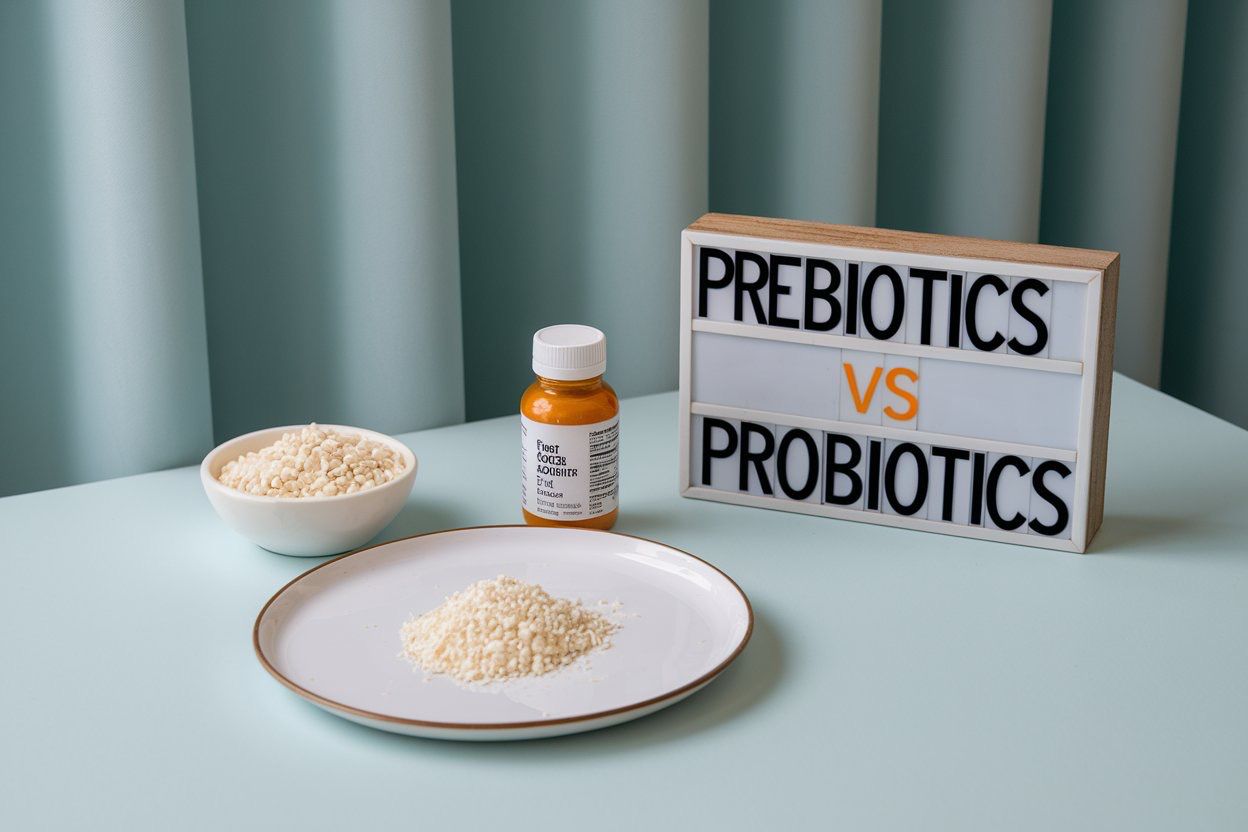
Gut health is essential for overall wellness, affecting everything from digestion to immune function and even mood. Two key players in achieving a balanced, healthy gut are prebiotics and probiotics. While these terms are often used interchangeably, they serve different but complementary roles in supporting digestive health. In this article, we’ll break down the differences between prebiotics vs probiotics and discuss their unique benefits, as well as how to incorporate them into your diet for optimal results.

A healthy gut is home to trillions of bacteria, fungi, and other microorganisms that contribute to overall health. These microorganisms help regulate digestion, immune responses, mood, and more. Maintaining a balanced gut microbiome is essential, and prebiotics vs probiotics are two essential elements in achieving this balance.
Prebiotics and probiotics are both crucial to gut health, but they play different roles:
Understanding the difference between prebiotics vs probiotics is important because they work together to optimize gut health. Prebiotics feed and sustain probiotics, while probiotics introduce beneficial bacteria to the gut, creating a powerful combination for digestive wellness.
The relationship between prebiotics and probiotics is a symbiotic one. Prebiotics provide the “fuel” needed for probiotics to thrive and grow, supporting a healthy gut environment. When both are present in adequate amounts, they promote a balanced microbiome, which in turn helps improve digestion, immunity, and mental clarity.
Both prebiotics and probiotics contribute to numerous health benefits, making them essential components of a balanced diet. Here’s a look at the top 10 benefits:
One of the most significant benefits of prebiotics vs probiotics is improved digestion. Probiotics help break down food and aid in nutrient absorption, while prebiotics ensure these beneficial bacteria have the fuel needed to thrive. Together, they reduce symptoms like bloating, constipation, and diarrhea, promoting regularity.
A large portion of your immune system resides in your gut, making gut health crucial for immunity. Probiotics help boost immune cells, such as IgA-producing cells, which are vital in defending against harmful pathogens. Prebiotics also play a role in strengthening the gut lining, acting as a barrier against infections and supporting a stronger immune response.
Probiotics assist in breaking down and absorbing nutrients like calcium, magnesium, and vitamin B. Prebiotics, by feeding probiotics, further support this process, ensuring your body absorbs the nutrients it needs to function optimally.
For those looking to maintain a healthy weight, both prebiotics vs probiotics can be helpful. Probiotics aid in the production of hormones related to hunger and satiety, helping you feel full longer, while prebiotics support metabolic functions and can help regulate fat storage.
Chronic inflammation can contribute to various health issues, from joint pain to heart disease. Probiotics help reduce inflammation by balancing the gut flora, and prebiotics, by nourishing these probiotics, help sustain this anti-inflammatory effect, offering potential relief for conditions like IBS and inflammatory skin conditions.
The gut-brain connection is strong, with gut health affecting mood and mental well-being. Probiotics are known to produce mood-enhancing neurotransmitters like serotonin, while prebiotics, by fostering a balanced microbiome, can help reduce symptoms of anxiety and depression.
Probiotics can help reduce LDL (bad cholesterol) levels, while prebiotics, by supporting probiotics, further contribute to heart health. Together, they aid in cholesterol regulation, blood pressure management, and overall cardiovascular health.
Both prebiotics vs probiotics play a role in skin health. Probiotics help reduce skin conditions like eczema and acne by controlling inflammation, while prebiotics support probiotics in regulating the skin’s microbial balance, leading to clearer, healthier skin.
Gut health can have a direct impact on energy levels. Probiotics help break down food more efficiently, and prebiotics ensure the probiotics are well-nourished, which can prevent fatigue and promote sustained energy throughout the day.
Both prebiotics and probiotics have preventive health benefits. Probiotics can help prevent digestive disorders and certain infections, while prebiotics help maintain gut health, lowering the risk of conditions like colon cancer and other gastrointestinal diseases.
Incorporating prebiotics into your diet is simple. Prebiotics are naturally found in high-fiber foods, such as:
Probiotics are abundant in fermented foods. Including these foods in your diet will provide live beneficial bacteria:
If you struggle to include these foods in your diet, probiotic supplements are also available, though it’s best to consult a healthcare provider before starting any new supplement.
Achieving the right balance of prebiotics vs probiotics is key to a healthy gut. Ideally, incorporate both into your daily diet:
Though prebiotics and probiotics are generally safe, some people may experience mild side effects, particularly when first introducing them. Common side effects include gas, bloating, and minor digestive discomfort as your gut adjusts. If symptoms persist, consult a healthcare provider to adjust the dosage or find a probiotic strain suited to your specific needs.
Both prebiotics vs probiotics offer valuable and together, they create a balanced and thriving digestive environment. By understanding the differences and unique benefits of each, you can make informed choices to support your gut microbiome effectively. Whether through diet or supplements, incorporating both prebiotics and probiotics into your routine can lead to improved digestion, a stronger immune system, and even better mood regulation. For a healthier, more balanced life, start prioritizing these gut-friendly powerhouses today!
Detox Your Body: 5 Powerful Foods to Support Natural Cleansing In today’s fast-paced world, your […]
Magnesium Benefits: Unlock the Power of This Essential Mineral for Optimal Health Magnesium is an […]
When most people think of cacao, they think of chocolate. But raw cacao, in its […]
Join our newsletter to get valuable information delivered straight to your inbox on gut health, hormones, nutrition, lifestyle and more, plus get access to your free guide!